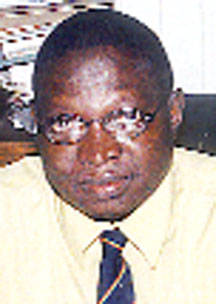Amid a damning report on the loss of parliamentary transcripts for the period 1985 to 1992, questions are being raised as to how none of these documents had been transformed into Hansards up to the year 2003 and why no one either on the government or the opposition benches moved to ensure that they were safeguarded.
A mystery shrouds the loss of the record of parliamentary proceedings for the entire tenure of late reformist PNC President Desmond Hoyte and Carl Greenidge – Finance Minister during those years – remains unconvinced that every effort was made to salvage and reconstruct documents which Speaker of the National Assembly Raphael Trotman said could have been water-damaged owing to a leak in the roof.
After an inquiry into the disappearance or destruction of the records, initiated upon a motion by Greenidge that was approved by the National Assembly, Speaker Trotman expressed reservation about whether the destruction of the documents was deliberate, saying that he could not say definitively in the absence of evidence.

He, however, pledged to keep the matter as a ‘cold case’ for investigation and follow up in the event that new evidence surfaces in the future.
The report said that 50 transcripts or part of the proceedings were available for 14 sittings between January 18, 1985 to October 25, 1985; 99 sittings between February 3, 1986 to December 28, 1989; 59 sittings between January 24, 1990 and September 29, 1991; and 20 sittings between December 3, 1991 to August 28, 1992.
In an initial reaction to the report by the Speaker, Greenidge was unimpressed with the efforts made and the explanations given.
“I have noted that the report itself is short, consisting of about five or six pages. The bulk of the report consists of historical background. All of that I am very appreciative of and I am going to review them again,” he said, while noting that there is the question of why it has taken nearly 10 years for the Parliament Office to have been informed or given an explanation about the missing documents.
“Records of this nature are exceedingly important, even in normal circumstances and I don’t know of any country, outside of a situation of war, where such records would have been allowed to be destroyed or disappear. The question that then arises in your mind is how important could those documents have been considered for them to have been placed on the floor and stored in a way that left them open to the elements. That is the thing that keeps going through my mind,” he said.

“I asked myself, if you had rain one night and these documents got soaked through the roof or directly, how much damage could that have done? I don’t get a feel from the report that any effort was made to save the documents. And, if an attempt was made, how many were saved?” he questioned.
“The exact date on which the rain fell is not here and so I find it very puzzling. The period in question is important because this is one of the few instances when a government that has managed the country when there were severe economic difficulties, when it managed to put in place a programme which remedied that situation,” Greenidge said, referring to the Hoyte administration.
‘Convenient’
He added that the missing records take on added importance now because of what he called the government’s routine suppression of that information or presenting it in a selective way. “It is very convenient… the economic policies… the speeches and so on of the period. The debates in Parliament… What positions the PPP took have all disappeared,” he said.
Greenidge added that among the recorded facts lost in the documentation is the National Assembly’s passage of a resolution requiring the government of the day to allow the opposition – then the PPP – to offer perspectives on how to fix the country’s economic problems. “All of that is part of our historical record, where a government reacted to a proposal in the House in a way that this PPP/C administration has never done. So the disappearance of the documents has to be considered very problematic and very convenient for the government,” he said.

Greenidge said that he managed to save documentation in his home after they would have been inundated in floodwater for a lengthy period following heavy rains.
“This stuff here could not have been standing in water. The report is strangely silent as to what efforts were made when the documents were discovered [soaked], how long they tried to retrieve the records and what degree of success they had,” he said. “I will be asking the Speaker to determine from his staff the answers to these questions,” he added.
Asked why it was that the documents would have been sitting as transcripts and not bound in the final form, Greenidge said, “From what [Frank] Narain said, from late 1992 early 1993, he had an agreement from Dr. Cheddi Jagan to put in place facilities for a library and so on. So, the question of storage would have arisen.”
He said that it wasn’t as if the records for the PNC administration period were not prepared. “These were not hand-written notes. These things were typed up. I remember my own interventions; the Clerk would send them to me for amendment and those I made a point of returning. There would have at least been one typed script. It isn’t normal in those circumstances to put the original as well as the typed script together and store them in a corner. The stuff that would have been recorded by the stenographer would have been in one place and those that would have been typed up and sent to the minister, sent to the parliamentarians…returns would have come back to them and when the parliamentarians would have amended…I would not expect them all to be in the same pile. So, the question is what has happened to the earlier drafts. I am particularly dissatisfied because I would have thought that those earlier versions would have been found and we would have had an attempt to reconstruct. There is such a silence that I am very suspicious,” he said, while adding that the result seems to “suit the government’s story too well.”
He said that in 2009, when he discovered the documents missing and again when Parliament met at the end of 2011 to brief the new parliamentarians, “We were given a story that the stuff probably got lost when it went to the printers, because the printer was dissatisfied that he hadn’t been paid.”
“What was the role of the previous Speaker? Could records as important as these be lost and there was no report made to the previous Speaker? Could we be so cavalier about our history?” he asked.
“I had made my concerns public about the missing documents and there was no response, not from the Speaker, not from the Clerk, not even from the opposition to the very honest,” Greenidge said. He said that it needs to be properly explained what happened when the documents went to the printers.
Government Parliamen-tarian Gail Teixeira cautioned Greenidge against casting aspersions that the records were deliberately destroyed. She asked that persons consider the conditions in which records are kept and said that every time records are moved, they get damaged or misplaced or misfiled.
She said that government reinstalled and reinstituted Hansards in the Parliament in 1993 because at that time Parliament had no capacity to do it. “So if we were the destroyers, burners and arsonists, as some Members on the other side seemed to have proclaimed, then why would these efforts, which I am going to document to this House, be done if we have no interest in what is the preservation of our country’s records?” she questioned, repeating what she said during the debate on the Motion.
‘Damaged beyond recognition’
Speaking to Stabroek News, Clerk of the National Assembly Sherlock Isaacs described how it was that the items were destroyed.
“The transcripts were in a room downstairs, among other documents. We moved them from that area to the little room where the media would have their snacks, about 2003 or thereabouts. One morning we found – because the room was locked we didn’t visit there every day – that there was this sudden leak. There was heavy rain and I guess some squall and water came into the room and wet – not only the transcripts but other documents. They were damaged beyond recognition.” He said.
“At the time we did not check to see what was damaged and what wasn’t damaged. We know it was a set of documents – personnel files, documents from the Prime Minister’s Office, accounting records all sorts of things,” Isaacs said, noting that all old records were kept in that office.
“A long time after we were preparing the Hansards and we realised some of the Hansards were among the records that were damaged. To my mind, there was no need for a report. It was brought to my attention when the records were damaged,” he said, when asked whether there was an official report of the findings.
Asked whether any attempt was made to save the documents by drying them out, he said that this would not have been possible since the majority of them were beyond saving.
“They were packed along the room and so the water was more intense… heavier in one area. In the other area, the documents were not damaged that badly.
Asked what year it would have been when it was discovered that transcripts for Hansard were among the destroyed documents, Isaacs said, “it was a couple of years back… you see we don’t keep records of these things. It would have been a few years back.”
Asked if it could have been before or around 2009 – when Greenidge said he realised the Hansards were missing – he said, “I can’t say… I wouldn’t want to commit myself.”
He said that after the PPP/C came into power in 1992, the Parliament Office utilised the services of Gordon Forte to produce the Hansards and later Leslie Forrester, up until about three years ago, about which time the Hansard department got started.
Former Clerk of the National Assembly Frank Narain said that some of the documents were not printed because “there were always a lot of problems with money and with getting things done.” He said too that it might have been a problem of final editing. He said that he knew that some of these transcripts were not printed. “There would have been several printed copies not yet bound and their transcripts stapled. We needed accommodation for Parliament and its records. We had little space,” Narain explained. “The staff kept asking for more space… our records were jumbled up and were all over the place…on chairs, on tables and on the floor,” he pointed out.
Narain was Clerk from 1966 to 2002 and had served in the Parliament since 1953. He said that from all the time that he served, there have always been problems with the roof. “That building used to have a lot of leaks. It was completed in 1832. That roof always had a lot of problems,” he recalled.
Efforts to reach former Leader of the Opposition Robert Corbin for a comment on the missing Hansards proved futile. Stabroek News also tried to contact former Speaker of the National Assembly Ralph Ramkarran but was told that he was unavailable because of illness.





